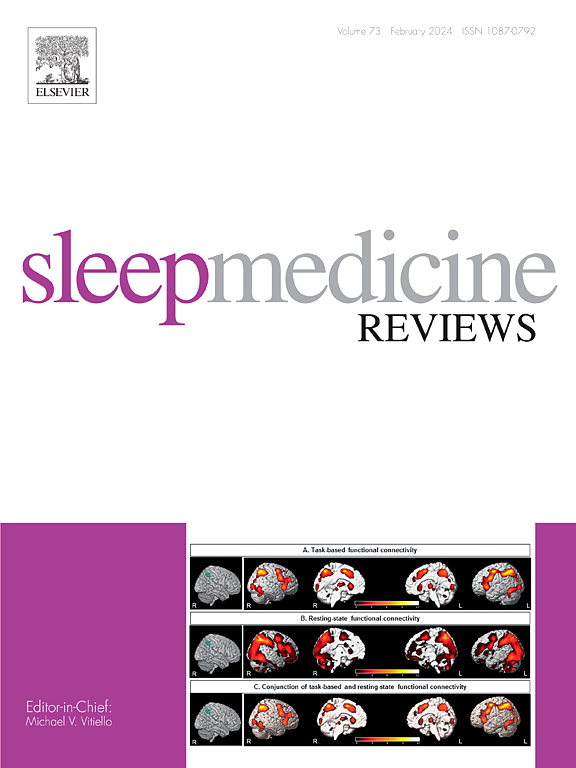The association between couple relationships and sleep: A systematic review and meta-analysis
IF 9.7
1区 医学
Q1 CLINICAL NEUROLOGY
引用次数: 0
Abstract
Growing evidence suggests a link between couple relationships and sleep, yet findings are inconsistent. We conducted a systematic review and meta-analysis, searching four databases up to March 2023, and included 62 studies with 43,860 participants. Results indicated a moderate correlation between better couple relationship quality and better overall sleep quality (r = 0.34, 95%CI = 0.09–0.59), as well as longer sleep duration (r = 0.39, 95%CI = 0.04–0.65). Regarding specific couple relationship domains, greater partner responsiveness was linked to improved overall sleep quality (r = 0.19, 95%CI = 0.13–0.25), while partner support showed no significant association (r = 0.03, 95%CI = −0.02-0.09). Increased partner conflict was associated with poorer overall sleep quality (r = 0.17, 95%CI = 0.06–0.27). In the studies that could not be meta-analyzed, greater partner conflict significantly correlated with longer actigraphy-based sleep latency and more wake episodes, but not necessarily with shorter actigraphy-based sleep duration. Increased self-disclosure was related to better overall sleep quality, whereas higher perceived rejection was linked to worse overall sleep quality. Higher closeness was not consistently associated with better overall sleep quality. Our results suggest a significant link between better couple relationships and improved sleep. Improving couple relationships may enhance sleep. However, further long-term cohort studies outside the USA are needed to evaluate these associations, particularly regarding specific couple relationship domains and specific sleep indicators.
夫妻关系与睡眠的关系:系统回顾和荟萃分析。
越来越多的证据表明,夫妻关系与睡眠之间存在联系,但研究结果并不一致。我们进行了一项系统回顾和荟萃分析,检索了截至2023年3月的四个数据库,共纳入了62项研究,43860名参与者。结果表明,较好的夫妻关系质量与较好的总体睡眠质量(r = 0.34,95%CI = 0.09-0.59)以及较长的睡眠时间(r = 0.39,95%CI = 0.04-0.65)之间存在中度相关性。在特定的夫妻关系领域,伴侣的回应能力越强,整体睡眠质量就越好(r = 0.19,95%CI = 0.13-0.25),而伴侣的支持则没有明显的关联(r = 0.03,95%CI = -0.02-0.09)。伴侣冲突的增加与总体睡眠质量较差有关(r = 0.17,95%CI = 0.06-0.27)。在无法进行荟萃分析的研究中,伴侣冲突的增加与基于动图的睡眠潜伏期延长和觉醒次数增多显著相关,但不一定与基于动图的睡眠持续时间缩短相关。更多的自我披露与更好的总体睡眠质量有关,而更高的排斥感则与更差的总体睡眠质量有关。较高的亲密程度与较好的整体睡眠质量并不一致。我们的研究结果表明,夫妻关系的改善与睡眠质量的提高之间存在重要联系。改善夫妻关系可能会提高睡眠质量。然而,我们还需要在美国以外地区开展进一步的长期队列研究,以评估这些关联,特别是关于特定夫妻关系领域和特定睡眠指标的关联。
本文章由计算机程序翻译,如有差异,请以英文原文为准。
求助全文
约1分钟内获得全文
求助全文
来源期刊

Sleep Medicine Reviews
医学-临床神经学
CiteScore
20.10
自引率
3.80%
发文量
107
期刊介绍:
Sleep Medicine Reviews offers global coverage of sleep disorders, exploring their origins, diagnosis, treatment, and implications for related conditions at both individual and public health levels.
Articles comprehensively review clinical information from peer-reviewed journals across various disciplines in sleep medicine, encompassing pulmonology, psychiatry, psychology, physiology, otolaryngology, pediatrics, geriatrics, cardiology, dentistry, nursing, neurology, and general medicine.
The journal features narrative reviews, systematic reviews, and editorials addressing areas of controversy, debate, and future research within the field.
 求助内容:
求助内容: 应助结果提醒方式:
应助结果提醒方式:


